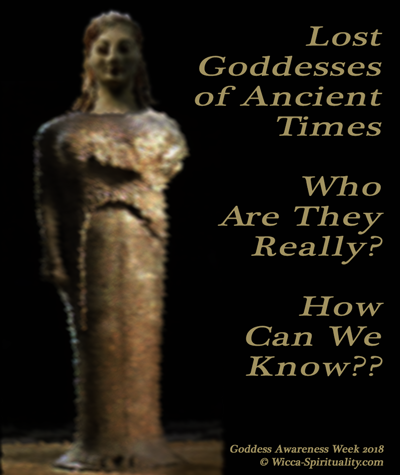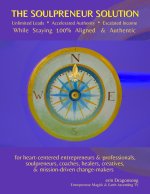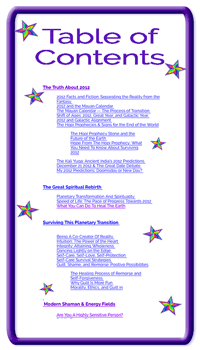Ancient Goddesses Gumbo
or
Will the Real Astarte Please Stand Up
When we look at ancient Goddesses of long-ago cultures, it's difficult to know exactly what we're seeing. To understand something from another culture, we must understand the mindset of those people... in this case, people who lived thousands of years ago.
That's very difficult, if not impossible, to do!
It's hard enough to imagine how people of our own time and similar cultures see things.
If you've ever learned another language, you'll understand some of what I mean. Every language has, embedded within it, certain ways of seeing the world that don't necessarily translate into other languages and cultures. Learning another language opens the mind to new possibilities of life and understanding.
Now consider that we're trying to understand cultures that could hardly be more alien to us than something from another planet.
Try to Time-Travel...
Think about this... My father grew up as a homesteader in a little tar paper shack on the Canadian prairies. No neighbours nearby, certainly no conveniences like stores — it was just them and the wilderness. He hunted to feed the family almost from when he could walk — squirrels at first; brought in his first moose while still a little boy — had to, or they wouldn't eat. Bear grease sandwiches, he said, were the worst! But they were happy to have them, when there was nothing else to fill the belly. They had an old stoneboat, like a big sledge; from the time he was about 5 years old, it was his job to drive the team of horses down to the river to get water for their garden. Using a big coffee can, he'd fill up a barrel on the stoneboat can by can until full, then drive it up to the garden... where he'd need to empty it, can by nail-punctured can, over all the crops! Repeating until everything was well-watered. They had no electricity of course, and an old pot-belly stove that they'd heat to cherry-red in the winter, but still the beds near the walls would be covered in ice or frost by morning. He rode to school on a farm horse, after morning chores and before evening work on the farm. He went to a one-room schoolhouse — the kind where the whole school had a couple dozen kids total, of all grades — and when an airplane flew overhead the teacher postponed the classes so everyone could run outside and marvel and wave. Can you put yourself in his shoes, feel what it must have been like? I can't... and that was only one generation back. What would his world-view be like, with that kind of upbringing? What would he believe about life? About his purpose? About the Divine?
Now Try Millennia Ago
Can we even truly imagine what it was to live even just a thousand years ago? In a time...| |
When "the whole world" meant an area perhaps a few hundred miles in size? |
| |
When the stars were absolutely unknown quantities, and the Moon was a mysterious vanishing-and-inexplicably-reappearing lantern in the night sky? |
| |
When viruses and bacteria, amoebas and cells, let alone DNA and atoms were not even conceived of, and the cause of illness was not remotely understood? |
| |
When an oil lamp was a high-tech source of light, and a scroll was a high-tech, possibly magical, captured voice or mind? |
| |
When most people made their own shoes, coats, clothes, hats, food, tools, houses, and virtually everything else they needed? |
| |
When your livelihood was determined by your birth rather than by your desires or talents? |
| |
When probably no one you knew could read, or would ever lay eyes on a book? |
| |
When no one you knew had gone more than 20 or 30 miles from home... and by foot? |
| |
When far distant animals like elephants, giraffes, ostriches, and Australians ( |
| |
When, if you wanted to say something, you had to seek out the person because there was no cell phone, email, telegraph, or probably even mail service? |
| |
When there was no running water, no hot water without boiling in a pot, no electrical gadgets of any kind, no watches, no computers, no bicycles, no disposable tissues, no toilet paper, no peanut butter, no restaurants, no Starbucks...? |
Goddesses Evolve, Just Like Everything Else

|
Adding More Confusion to the Soup
This confusion is increased by ancient scholars' tendency to simplify matters by cognating familiar Deities with foreign ones. And with the difficulty that spelling the names of these Deities sometimes used letters or signifiers that are lacking or easily confused in our language ( for instance, the crucial ’alpu/ ’alef letter (
What's the Right Thing to Do?
So what can a well-meaning Wiccan do, when we wish to honour one of these Goddesses? How do we know what to honor and how? This becomes a wonderful opportunity to choose the Deities we will love and serve. We can honor Athiratu as Asherah if we like; we can honor ‘Athtartu or Astarte or Aphrodite as one or three Deities. It's not a case of which is right and which is wrong. Each is right in its own time and place... at least to the best of our understanding. They have been honored in virtually every configuration we could imagine. After all, every person perceives the Divine in their own idiosyncratic way — my Goddess is not precisely the same as anyone else's Goddess, even if we come from the same training and believe we're celebrating the same one. What we really need to do to make sense of this "Goddess Gumbo" is to look at it from an elevated perspective.What Would the Goddesses Want?
We might think that we are insulting a certain Goddess if we get Her name or attributes wrong, if we worship Her in a form that was never historically accurate. But is that really true? There are levels of Divinity, some of Them almost human in Their ego-identity — that is, They have the same personality foibles and frustrations as the rest of us. But in truth, at the fundamental level, the Divine is One. This Divine Source doesn't care what we call it, how we worship it, what we think of it. If the Divine cares at all for our actions, it only cares for our reverence... that is, for our love for it and our hunger to merge with it. It does not care whether we are more drawn to it eye or its lips or its breast or its kneecap! It doesn't care whether we call its name in English or Swahili or Latin or Sumerian. Humans find it easier to work with the Divine in more personable forms — this Goddess or that God or another Elevated Being — so we come up with various names and kinds of Deity. And that's great! Whatever works for us, is what the Divine wants for us.
So all that really matters is to
choose Deities that bring forth the best in the us —
those that elevate our thoughts and emotions,
that enlighten our awareness of ourselves and all that is,
that inspire us to higher ideals,
and that encourage us to better actions.
When we see in our Goddesses the best of ourselves, the best of the Divine, we are seeing the truth of Them. At the least, we are seeing Who the Goddesses would want to be.
With Brightest Blessings,
erin Dragonsong












